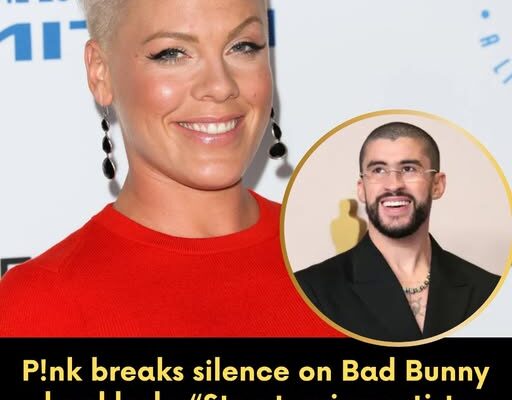“Music is not your border wall.” With that one fiery sentence, P!nk threw herself into the Bad Bunny drama and shifted the conversation. Why did she speak now, and what does it mean for artists under fire? The answers will surprise you
When P!nk declared, “Music is not your border wall,” the phrase rippled through the entertainment world like a lightning bolt. In seven words, she managed to both defend a fellow artist and challenge the increasingly polarized way audiences react to musicians. The comment came amid a wave of controversy surrounding Bad Bunny, whose recent remarks and artistic choices had drawn intense scrutiny and backlash online. As social media fractured into camps of defenders and critics, P!nk’s sudden entry into the discussion shifted the tone entirely. Known for her sharp intellect, no-nonsense authenticity, and willingness to say what others won’t, she injected a powerful dose of perspective into a debate that had quickly turned toxic. Her message was clear: art should unite, not divide; music should be a bridge, not a barrier. But why did she choose this moment to speak up, and what deeper meaning lies behind her words?
To understand the impact of P!nk’s statement, it’s essential to consider the cultural storm that surrounded Bad Bunny at the time. The Puerto Rican superstar, one of the most influential artists in the world, had been caught in a controversy that spanned everything from political statements to music video imagery. Critics accused him of hypocrisy, while supporters insisted his art had always been about pushing boundaries and speaking truth to power. The debate quickly spiraled beyond the specifics of his actions, morphing into a broader discussion about the role of artists in political and cultural discourse. Fans demanded moral purity from musicians, while others argued that expecting flawless behavior from creative figures is unrealistic. Amid this noise, P!nk’s words landed as a sharp reminder that music’s purpose transcends ideological lines. “Music is not your border wall” wasn’t just a defense of Bad Bunny—it was a rejection of the idea that art should be used to segregate people by beliefs, background, or political stance.
P!nk’s decision to weigh in carried particular weight because of her own long-standing relationship with controversy. Throughout her career, she has built an identity around defiance—of genre norms, gender expectations, and the demands of the industry. From her early days of rebellious pop anthems to her more recent socially conscious songwriting, she has consistently used her platform to promote empathy, resilience, and open dialogue. Her message to those attacking Bad Bunny was rooted in that same philosophy: that art is supposed to provoke, inspire, and challenge, not to conform to a single worldview. By framing music as something that transcends ideological walls, she reminded the public that creativity is inherently messy, complex, and deeply human. In doing so, she positioned herself not only as a defender of another artist but also as a protector of artistic freedom itself.
The timing of her statement was also significant. Over the past few years, the entertainment industry has become a battleground for cultural identity and moral debate. Artists are no longer judged solely on their output but also on their perceived alignment with various political and social causes. Social media has amplified this dynamic, turning every tweet, lyric, or performance into potential fodder for outrage. In this environment, a single misstep—or even an unpopular opinion—can lead to calls for boycotts, cancellations, or public shaming. By intervening in the Bad Bunny situation, P!nk appeared to be pushing back against this trend. Her statement was as much about the broader ecosystem of outrage as it was about one artist’s controversy. The metaphor of the “border wall” was particularly pointed, symbolizing the divisions people build around themselves to separate the acceptable from the unacceptable, the righteous from the condemned. Her message implied that these divisions have no place in the world of music, where the goal is to connect people across barriers, not to reinforce them.
The reaction to P!nk’s statement was immediate and intense. Fans of Bad Bunny praised her for stepping up in his defense, celebrating her as an artist who understands the struggles of navigating fame in an age of constant scrutiny. Others saw her words as a universal message of solidarity for all creatives facing backlash. But as with any polarizing issue, there were detractors as well. Some argued that her statement oversimplified the issue, dismissing legitimate criticism of artists’ actions. Others accused her of opportunism, suggesting she was inserting herself into a conversation to stay relevant. Yet even her critics acknowledged that her comment had reignited an important conversation about the boundaries of accountability and expression in the modern entertainment landscape. Whether people agreed with her or not, they were talking about what she said—and that, in itself, was part of her intention.
What made her statement so powerful was not just its content but its delivery. P!nk’s reputation for authenticity gave her words credibility. When she speaks, people listen because they believe she means it. Unlike some celebrities who issue carefully crafted PR responses, P!nk’s statements often feel raw and unfiltered, the product of genuine conviction rather than strategic calculation. Her directness—“Music is not your border wall”—stripped away the layers of online noise and moral posturing, distilling the issue to its essence. In doing so, she reminded both fans and fellow artists that creative expression exists in a different realm than politics or ideology. It doesn’t mean artists are exempt from accountability; rather, it means that art should not be weaponized to police identity or belief.
Her intervention also highlighted the role of empathy in the creative process. Throughout her career, P!nk has emphasized that the best art often comes from vulnerability, imperfection, and contradiction. By defending Bad Bunny, she was, in a way, defending the right of all artists to stumble, experiment, and evolve without being permanently defined by a single controversy. “Music is not your border wall” could be interpreted as a call to audiences to listen with openness, to recognize that art’s value lies in its ability to make us confront discomfort rather than retreat behind the safety of moral certainties. It was an invitation to tear down the figurative walls that divide people based on their interpretations of art and to return to a place where music can be shared and debated without becoming a weapon.
The ripple effects of her statement went beyond the immediate Bad Bunny discussion. Other musicians began referencing her words, some agreeing that the culture of outrage had gone too far, while others insisted that artists must still be held accountable for their influence. In many ways, this was exactly the kind of dialogue P!nk hoped to spark—a messy, honest conversation about where the line should be drawn between critique and cancellation, between holding artists responsible and allowing them to be human. The phrase “Music is not your border wall” quickly trended across social media platforms, used by fans and creators alike to argue for a more inclusive, less judgmental approach to art. What began as a spontaneous defense of one artist evolved into a broader rallying cry for creative freedom.
For P!nk herself, this episode reaffirmed her place as one of the few artists willing to speak truthfully about the pressures of fame and the moral contradictions of modern culture. She has always been at her best when challenging hypocrisy—whether in the music industry, politics, or social behavior—and this moment was no different. Her statement cut through the noise and reminded people of something essential: that music’s purpose is to heal, to connect, and to express the parts of humanity that politics cannot touch. Art loses its power when it becomes a tool of division; it gains strength when it dares to reach across boundaries.
In the end, P!nk’s fiery sentence was more than just a reaction—it was a manifesto. “Music is not your border wall” encapsulated everything she has stood for throughout her career: defiance, compassion, and the belief that creativity belongs to everyone. It was a challenge to audiences to think deeper about how they engage with art, to resist the impulse to categorize or condemn, and to remember that true artistry thrives in spaces where empathy and disagreement coexist. Whether defending Bad Bunny or speaking for artists at large, P!nk reminded the world that music’s greatest power lies not in separation but in unity. Her words turned a fleeting controversy into a lasting statement about what it means to be an artist—and what it means to listen with an open heart.



